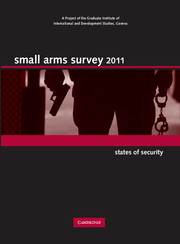Book contents
- Frontmatter
- Foreword
- Contents
- About the Small Arms Survey
- Notes to readers
- Acknowledgements
- Introduction
- Chapter 1 Larger but Less Known: Authorized Light Weapons Transfers
- Chapter 2 Fact or Fiction?: The UN Small Arms Process
- Chapter 3 Procurement and Policy: Police Use of Emerging Weapons Technology
- Chapter 4 A Booming Business: Private Security and Small Arms
- Chapter 5 Protected but Exposed: Multinationals and Private Security
- Chapter 6 Ethos of Exploitation: Insecurity and Predation in Madagascar
- Chapter 7 Reforming the Ranks: Public Security in a Divided Côte d'Ivoire
- Chapter 8 Securing the State: Haiti before and after the Earthquake
- Chapter 9 Balancing Act: Regulation of Civilian Firearm Possession
- Index
Foreword
Published online by Cambridge University Press: 05 March 2012
- Frontmatter
- Foreword
- Contents
- About the Small Arms Survey
- Notes to readers
- Acknowledgements
- Introduction
- Chapter 1 Larger but Less Known: Authorized Light Weapons Transfers
- Chapter 2 Fact or Fiction?: The UN Small Arms Process
- Chapter 3 Procurement and Policy: Police Use of Emerging Weapons Technology
- Chapter 4 A Booming Business: Private Security and Small Arms
- Chapter 5 Protected but Exposed: Multinationals and Private Security
- Chapter 6 Ethos of Exploitation: Insecurity and Predation in Madagascar
- Chapter 7 Reforming the Ranks: Public Security in a Divided Côte d'Ivoire
- Chapter 8 Securing the State: Haiti before and after the Earthquake
- Chapter 9 Balancing Act: Regulation of Civilian Firearm Possession
- Index
Summary
The provision of effective and accountable public security continues to be a major challenge in the 21st century. Violence manifests itself in many different ways in places as diverse as the streets of Chicago, the north of Mexico, and several regions in Yemen. To meaningfully address this variety is a challenge for well-resourced, stable countries with legitimate leadership. It is all the more difficult for fragile countries with weak capacity, sometimes-contested leadership, or fractured or under-resourced security institutions. Yet it is in these settings that basic security matters most. We know that violence has significant and long-lasting negative effects on development. Even in the absence of violence, the lack of an effective and accountable level of security and justice delivery slows down development. Violence also creates negative global externalities that affect all of us.
While national authorities as well as multilateral and bilateral agencies are increasingly prioritizing security and justice development as part of their peacebuilding and state-building efforts, much more remains to be done. Many populations continue to be under-served. In a range of settings, communities, groups, and individuals may feel compelled to provide for their own security, often with uneven results. Certain states opt to shift some of the security ‘burden’ from the public to the private sector.
- Type
- Chapter
- Information
- Small Arms Survey 2011States of Security, pp. iiiPublisher: Cambridge University PressPrint publication year: 2011



